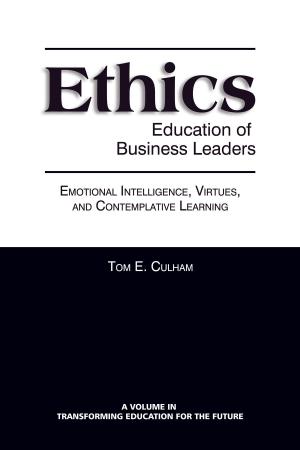Education of Students with an Intellectual Disability
Research and Practice
Nonfiction, Reference & Language, Education & Teaching, Special Education, Higher Education| Author: | Phil Foreman | ISBN: | 9781607522560 |
| Publisher: | Information Age Publishing | Publication: | July 1, 2009 |
| Imprint: | Information Age Publishing | Language: | English |
| Author: | Phil Foreman |
| ISBN: | 9781607522560 |
| Publisher: | Information Age Publishing |
| Publication: | July 1, 2009 |
| Imprint: | Information Age Publishing |
| Language: | English |
This book is designed as a collegelevel textbook introducing readers to all aspects of intellectual disability in children, from birth to the end of schooling, with an educational focus. The book will be of interest to persons training as special education teachers or who are training as regular teachers with a focus on special education. It will also be relevant reading for parents of children with intellectual disability, for practicing teachers, and for other professionals working with such children (psychologists, social workers, nurses, therapists). The field of special education and intellectual disability practice has been strongly influenced by legislation in the United States. The United States is also the source of most research in the disability field. For this reason, there is an emphasis in this book on research and practice in the United States. However, there is also coverage of research and practice in Australia (where the author is located); the UK, where there are several leading research groups; and other parts of the world. Instructors may wish to use the book as the basis of a onesemester unit on the education of students with intellectual disability. Each chapter could be treated over 1 or 2 weeks, depending on the focus of the group and the particular interest of the instructor. A group with an early childhood focus would spend more time on early intervention. A secondaryfocused group might spend more time on postschool options. Each major chapter section has questions for discussion or reflection, and there are also discussion questions about the case studies provided in each chapter. This book provides readers with uptodate information on the latest research on the identification and definition of intellectual disability, assessment of intellectual disability and adaptive behavior, causes of intellectual disability, educational options and alternatives, early intervention for young children with intellectual disability, and practical approaches to teaching and intervention. In the final chapter, the author reviews options for students at the end of their formal schooling.
This book is designed as a collegelevel textbook introducing readers to all aspects of intellectual disability in children, from birth to the end of schooling, with an educational focus. The book will be of interest to persons training as special education teachers or who are training as regular teachers with a focus on special education. It will also be relevant reading for parents of children with intellectual disability, for practicing teachers, and for other professionals working with such children (psychologists, social workers, nurses, therapists). The field of special education and intellectual disability practice has been strongly influenced by legislation in the United States. The United States is also the source of most research in the disability field. For this reason, there is an emphasis in this book on research and practice in the United States. However, there is also coverage of research and practice in Australia (where the author is located); the UK, where there are several leading research groups; and other parts of the world. Instructors may wish to use the book as the basis of a onesemester unit on the education of students with intellectual disability. Each chapter could be treated over 1 or 2 weeks, depending on the focus of the group and the particular interest of the instructor. A group with an early childhood focus would spend more time on early intervention. A secondaryfocused group might spend more time on postschool options. Each major chapter section has questions for discussion or reflection, and there are also discussion questions about the case studies provided in each chapter. This book provides readers with uptodate information on the latest research on the identification and definition of intellectual disability, assessment of intellectual disability and adaptive behavior, causes of intellectual disability, educational options and alternatives, early intervention for young children with intellectual disability, and practical approaches to teaching and intervention. In the final chapter, the author reviews options for students at the end of their formal schooling.















